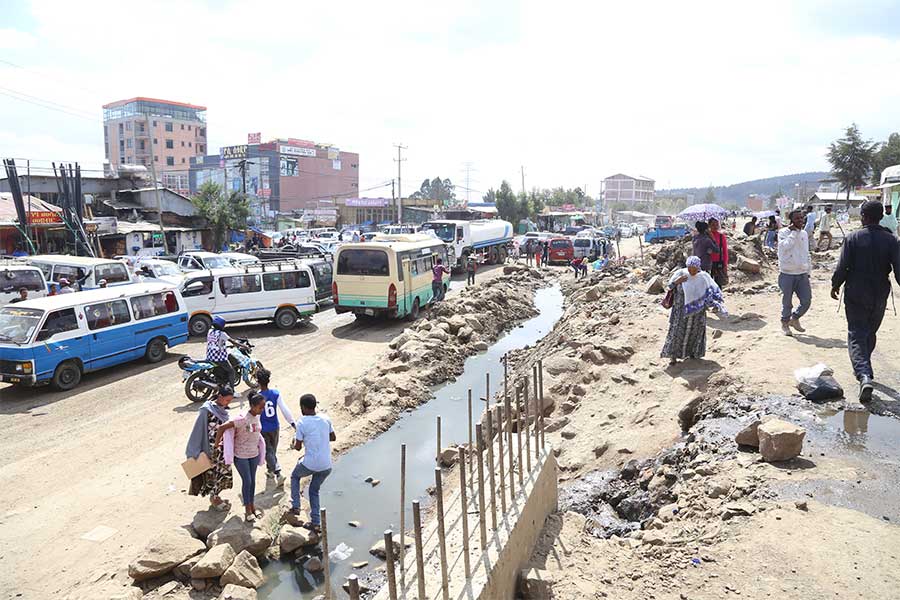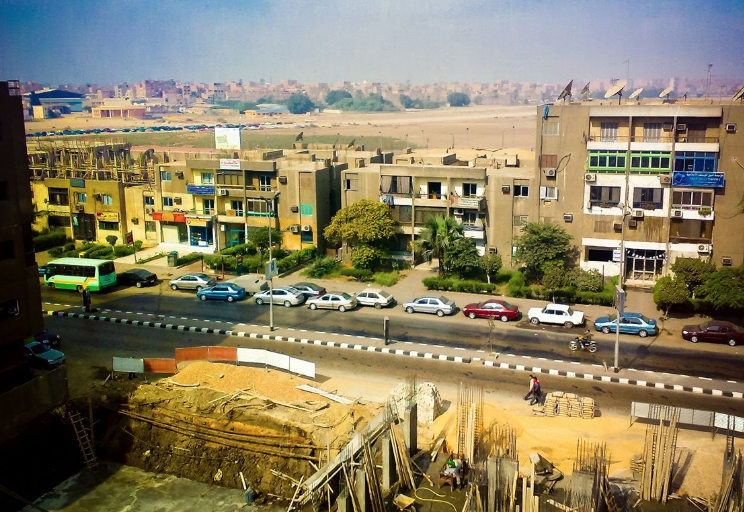
Featured | Dec 21,2019
May 18 , 2024.
Prime Minister Abiy Ahmed (PhD) took a handful of his cabinet members last week to the newly illuminated offices of Chaltu Sani, the minister of Urban & Infrastructure Development, on Ras Abebe Aregay Road, near the National Theater. The Prime Minister posted photos of his visit on the X platform, declaring that “ergonomics and creating conducive environments” in public offices are “ongoing priorities” for his administration.
This seems to be the era of ergonomics in Ethiopia, a term derived from Greek that blends the concepts of work and law. Ergonomics emphasises human activities and interactions with tools to create efficient, safe, and comfortable environments. Federal agencies nationwide are embracing this philosophy, spending tens of millions of Birr to redesign, remodel, and beam their buildings. The resulting transformations give the impression of a "beauty contest" among these agencies, each striving to outshine the other.
However, the contradiction is no less glaring.
Federal authorities are ostensibly trimming public expenditures yet allocating substantial resources to urban aesthetics. The "architectural renaissance" in Addis Abeba might mislead a casual observer into thinking Ethiopia has discovered newfound oil wealth. However, the country has defaulted on its external debt commitment for the first time, endured double-digit inflation for consecutive years, and effectively halted new capital projects nationwide. The share of capital expenditure in the budget to the GDP has continued to decline since 2017.
Only last week, Finance Minister Ahmed Shide took a stern position as he reviewed budget proposals from various ministries, often sending them back for revision. His deputy, State Minister Eyob Tekalegn (PhD), informed representatives from public universities that there would be no new projects next year. His statement reminds the public of the contractionary fiscal and tight monetary policies needed in an economy under the grip of public debt and the resulting runaway inflation.
Ethiopia's public sector debt modestly increased by 1.63pc in the six months leading up to December last year, reaching 64.3 billion dollars, representing 39.4pc of the country's nominal GDP. It includes commitments by the federal government, debts guaranteed for state-owned enterprises (SOEs), and non-guaranteed debts of public enterprises such as Ethiopian Airlines. Each category plays a particular role in the federal government’s fiscal position and has different implications for macroeconomic stability.
One is the rise in public debt, demonstrating the authorities' fiscal problems in managing a growing debt during global economic disruptions.
Reconciling the life-saving needs of over 20 million Ethiopians requiring emergency assistance and the backlog of unfinished public projects with the current administration's priorities of bike lanes could become a Herculean task, straining the bounds of pragmatic fiscal management. It also requires extraordinary mental gymnastics to reconcile billions spent on bike lanes and pedestrian walkways in the capital with the reality that much of the country lacks functional roads.
Public expenditure should be sensitive to Ethiopians' most pressing needs — food, water, health, and security — especially when austerity is the order of the day. This contrasts sharply with the Prime Minister's grand "smart city" ambitions.
An aesthetic vision to which much of the population has not been privy has led to massive demolitions, resettlement of thousands, and billions paid in compensation. The term "corridor" has taken on a menacing connotation for property owners in the capital, who worry whether their homes or businesses could be demolished for a "development" project that seems to have materialised out of nowhere. Even public offices with sparkling new compounds have seen parts of their fences removed, only a few months after they were completed, revealing the high-handed nature of these projects.
Undoubtedly, greenery and manicured sidewalks may be visually appealing. But, they should not come at the expense of university budgets, road and bridge constructions, or wages for public service members in newly formed regional states. Managing public finance requires a balance.
The administration appears to believe that the final products of these projects, rarely consulted with the public and begun abruptly, will awe Ethiopians into acquiescence. Yet, the perceptible difference between the administration's priorities and those of everyday Ethiopians could be politically costly for the incumbent Prosperity Party (PP). The inconvenience and suffering caused by the displacement of thousands of residents can unveil deeper issues.
It would be unreasonable to blame citizens should they question the economic value of billions invested in these projects, for the crucial question remains: What do policymakers consider the country's budgetary priorities for the coming year?
Transforming Addis Abeba, already with better public infrastructure than other cities and towns, into an even more "beautiful city" could prove politically costly. Amid the imminent devaluation of the Birr against major currencies, the entry of foreign capital into the retail market, and other sweeping reforms, the incumbent cannot afford to remain ambiguous or lose public support further. The macroeconomy's sensitivity to additional shocks is at an all-time high.
The economy is wrestling with the dilemma of managing borrowing while maintaining growth momentum. Data from 2019/20 to the end of 2022/23 indicates a cautious yet expected increase in external and domestic borrowing. External debt rose by 1.02pc, while domestic debt saw a notable rise of 2.12pc.
Despite these increases, Ethiopia's debt metrics remain within sustainable boundaries for low-income countries. External debt remains at 17.5pc of GDP, well below the cautionary threshold of 40pc. An internal document from the Ministry of Finance attributed this to the government's "careful debt management strategy," supported by consistent economic growth.
In 2023, the GDP grew by 6.2pc, a percentage point lower than government officials claim. However, the growth rate has declined since the 2010s, when GDP was expanding by double digits, fueled by massive public infrastructure investments mainly financed by external loans from China and multilateral financial institutions, which led to ballooning public debt. A substantial portion of public debt is external loans, with major creditors, including the World Bank's International Development Association (IDA), unveiling Ethiopia's ongoing need for concessional loans. These loans offer lower interest rates and more extended maturity periods, easing repayment pressures.
In 2021, the federal government established the Ethiopian Investment Holding (EIH), a sovereign wealth fund designed to manage state assets and generate revenue independently of traditional fiscal mechanisms. Along with the establishment of a Capital Market by mid-2021, this marked a shift towards diversifying funding sources and reducing reliance on external debt. It has also leveraged financial instruments like Treasury Bills, which have seen an increase in yield, reflecting the rising cost of government borrowing. While this strategy expands the domestic debt portfolio, it also attempts to fulfil the dual purpose of financing government projects and cultivating a local investor base.
Fiscal strategy is also evident in the government's management of debt service obligations. The G20 Debt Service Suspension Initiative (DSSI) provided essential fiscal relief but ended last year. New negotiations with private, bilateral, and multilateral creditors are ongoing, the latest held in Washington D.C. in April with the IMF, but no deal has yet been reported. However, IMF officials announced progress leading to a final deal has been made.
Whatever Ethiopia's leaders' concessions to external creditors and the IMF are, policymakers' approach to managing public debt should balance immediate fiscal needs with long-term economic goals. A prudent debt management strategy, supported by economic expansion, can help maintain debt sustainability within acceptable limits.
Yet, the country continues to face painful fiscal pressures from the complexities of managing external debt and domestic borrowing during a period of extreme public polarisation encapsulated with violent political confrontations on several fronts. Initiatives like the Ethiopian Investment Holding and the Capital Market could help diversify sources of funds and reduce reliance on external debt. However, balancing borrowing with economic growth will be crucial for long-term fiscal stability and sustainable development.
Cutting back on fuel subsidies, education, and soon electricity, while operating on a tight budget, is fraught with peril. An opaque public expenditure policy that values aesthetics over addressing urgent public needs can have serious consequences.
The cost of living is likely to rise further. Higher fuel prices will push up transportation costs, which will, in turn, increase the price of goods and services. Electricity cutbacks will raise energy costs for households and businesses, squeezing tight budgets. Economic growth will falter after businesses facing higher operational costs from increased fuel and electricity prices may see reduced profit margins, potentially leading to layoffs or closures. The social fabric will undoubtedly be strained, followed by an inevitable public discontent. When the government prioritises aesthetics over urgent public concerns, dissatisfaction will grow.
Prosperitians and their policymakers will be compelled to redefine what austerity and fiscal consolidation mean in this context.
PUBLISHED ON
May 18,2024 [ VOL
25 , NO
1255]

Featured | Dec 21,2019

Commentaries | Feb 24,2024

Fortune News | Dec 01,2024

Radar | Dec 12,2023

Commentaries | Sep 03,2022

Viewpoints | Dec 29,2018

Radar | Jan 15,2022

Editorial | Mar 27,2021

Fortune News | Jun 08,2019

Advertorials | Jul 17,2023

My Opinion | 131819 Views | Aug 14,2021

My Opinion | 128203 Views | Aug 21,2021

My Opinion | 126147 Views | Sep 10,2021

My Opinion | 123767 Views | Aug 07,2021

Dec 22 , 2024 . By TIZITA SHEWAFERAW
Charged with transforming colossal state-owned enterprises into modern and competitiv...

Aug 18 , 2024 . By AKSAH ITALO
Although predictable Yonas Zerihun's job in the ride-hailing service is not immune to...

Jul 28 , 2024 . By TIZITA SHEWAFERAW
Unhabitual, perhaps too many, Samuel Gebreyohannes, 38, used to occasionally enjoy a couple of beers at breakfast. However, he recently swit...

Jul 13 , 2024 . By AKSAH ITALO
Investors who rely on tractors, trucks, and field vehicles for commuting, transporting commodities, and f...

Jul 6 , 2025 . By BEZAWIT HULUAGER
The federal legislature gave Prime Minister Abiy Ahmed (PhD) what he wanted: a 1.9 tr...

Jul 6 , 2025 . By YITBAREK GETACHEW
In a city rising skyward at breakneck speed, a reckoning has arrived. Authorities in...

Jul 6 , 2025 . By NAHOM AYELE
A landmark directive from the Ministry of Finance signals a paradigm shift in the cou...

Jul 6 , 2025 . By NAHOM AYELE
Awash Bank has announced plans to establish a dedicated investment banking subsidiary...